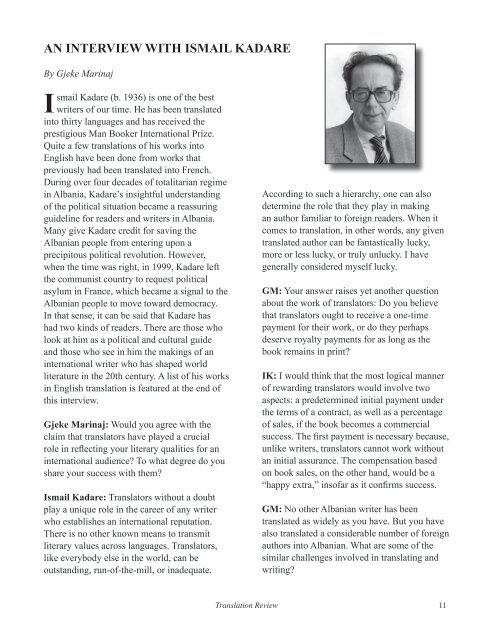Table of contents - The University of Texas at Dallas
Table of contents - The University of Texas at Dallas
Table of contents - The University of Texas at Dallas
You also want an ePaper? Increase the reach of your titles
YUMPU automatically turns print PDFs into web optimized ePapers that Google loves.
AN INTERVIEW WITH ISMAIL KADARE<br />
By Gjeke Marinaj<br />
Ismail Kadare (b. 1936) is one <strong>of</strong> the best<br />
writers <strong>of</strong> our time. He has been transl<strong>at</strong>ed<br />
into thirty languages and has received the<br />
prestigious Man Booker Intern<strong>at</strong>ional Prize.<br />
Quite a few transl<strong>at</strong>ions <strong>of</strong> his works into<br />
English have been done from works th<strong>at</strong><br />
previously had been transl<strong>at</strong>ed into French.<br />
During over four decades <strong>of</strong> totalitarian regime<br />
in Albania, Kadare’s insightful understanding<br />
<strong>of</strong> the political situ<strong>at</strong>ion became a reassuring<br />
guideline for readers and writers in Albania.<br />
Many give Kadare credit for saving the<br />
Albanian people from entering upon a<br />
precipitous political revolution. However,<br />
when the time was right, in 1999, Kadare left<br />
the communist country to request political<br />
asylum in France, which became a signal to the<br />
Albanian people to move toward democracy.<br />
In th<strong>at</strong> sense, it can be said th<strong>at</strong> Kadare has<br />
had two kinds <strong>of</strong> readers. <strong>The</strong>re are those who<br />
look <strong>at</strong> him as a political and cultural guide<br />
and those who see in him the makings <strong>of</strong> an<br />
intern<strong>at</strong>ional writer who has shaped world<br />
liter<strong>at</strong>ure in the 20th century. A list <strong>of</strong> his works<br />
in English transl<strong>at</strong>ion is fe<strong>at</strong>ured <strong>at</strong> the end <strong>of</strong><br />
this interview.<br />
Gjeke Marinaj: Would you agree with the<br />
claim th<strong>at</strong> transl<strong>at</strong>ors have played a crucial<br />
role in reflecting your literary qualities for an<br />
intern<strong>at</strong>ional audience To wh<strong>at</strong> degree do you<br />
share your success with them<br />
Ismail Kadare: Transl<strong>at</strong>ors without a doubt<br />
play a unique role in the career <strong>of</strong> any writer<br />
who establishes an intern<strong>at</strong>ional reput<strong>at</strong>ion.<br />
<strong>The</strong>re is no other known means to transmit<br />
literary values across languages. Transl<strong>at</strong>ors,<br />
like everybody else in the world, can be<br />
outstanding, run-<strong>of</strong>-the-mill, or inadequ<strong>at</strong>e.<br />
According to such a hierarchy, one can also<br />
determine the role th<strong>at</strong> they play in making<br />
an author familiar to foreign readers. When it<br />
comes to transl<strong>at</strong>ion, in other words, any given<br />
transl<strong>at</strong>ed author can be fantastically lucky,<br />
more or less lucky, or truly unlucky. I have<br />
generally considered myself lucky.<br />
GM: Your answer raises yet another question<br />
about the work <strong>of</strong> transl<strong>at</strong>ors: Do you believe<br />
th<strong>at</strong> transl<strong>at</strong>ors ought to receive a one-time<br />
payment for their work, or do they perhaps<br />
deserve royalty payments for as long as the<br />
book remains in print<br />
IK: I would think th<strong>at</strong> the most logical manner<br />
<strong>of</strong> rewarding transl<strong>at</strong>ors would involve two<br />
aspects: a predetermined initial payment under<br />
the terms <strong>of</strong> a contract, as well as a percentage<br />
<strong>of</strong> sales, if the book becomes a commercial<br />
success. <strong>The</strong> first payment is necessary because,<br />
unlike writers, transl<strong>at</strong>ors cannot work without<br />
an initial assurance. <strong>The</strong> compens<strong>at</strong>ion based<br />
on book sales, on the other hand, would be a<br />
“happy extra,” ins<strong>of</strong>ar as it confirms success.<br />
GM: No other Albanian writer has been<br />
transl<strong>at</strong>ed as widely as you have. But you have<br />
also transl<strong>at</strong>ed a considerable number <strong>of</strong> foreign<br />
authors into Albanian. Wh<strong>at</strong> are some <strong>of</strong> the<br />
similar challenges involved in transl<strong>at</strong>ing and<br />
writing<br />
Transl<strong>at</strong>ion Review 11

















